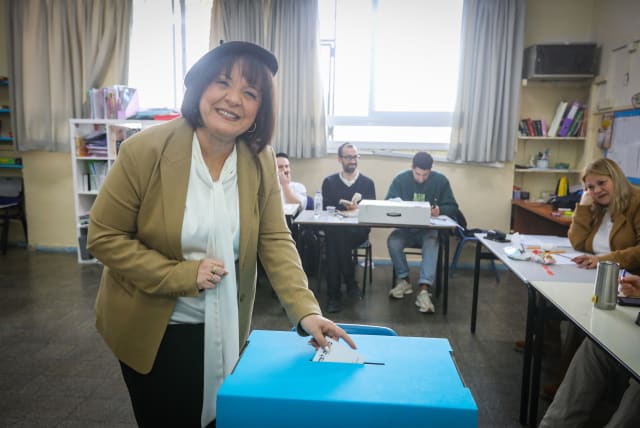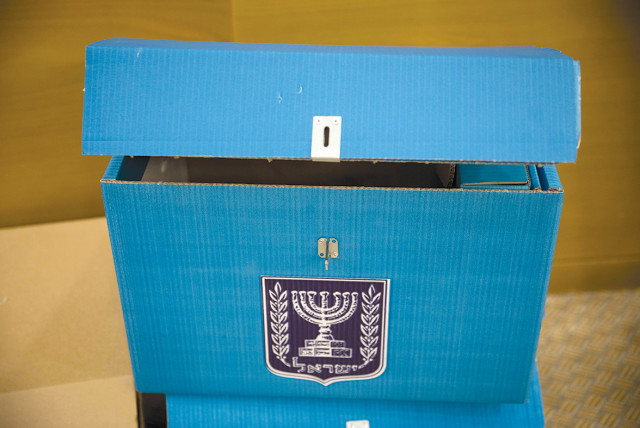American olim in Beit Shemesh may tip the scales in the mayoral election

The race for the mayorship of Beit Shemesh is shaping up to be one of the most dramatic in the current round of local authority elections.
Will American olim in the city of Beit Shemesh tip the scales in the mayoral election on Tuesday? One American candidate, an immigrant, may cause just that.
The race for the mayorship of Beit Shemesh is shaping up to be one of the most dramatic in the current round of local authority elections. After five years in which Aliza Bloch, who sometimes took controversial steps for the city, served in the role, she now faces another public test for an additional term - and her competitors are powerful. Unlike in other cities where the incumbent mayor manages to secure a clear victory or defeat almost unanimously - in Beit Shemesh, the race is so close that no one can predict who will be the next mayor.
Bloch targets the general public, making up a third of the city. She is also the closest option for secular, religious Zionists and part of the modern Orthodox who do not want to live by the strict Orthodox standard: those looking for progress alongside Torah study. Such a concentration exists in abundance in neighborhood D of the city, but due to its diversity - it's a big question mark for pollsters, and all candidates are courting it. Bloch ran a relatively quiet campaign compared to the other candidates, focusing on her achievements in the last five years, not negative campaigning.
Bloch, an Israeli educator and politician, became Beit Shemesh's first female mayor in 2018 and was named one of the world's 50 most influential Jews by The Jerusalem Post in 2019. After an unsuccessful mayoral run in 2013, Bloch defeated the incumbent mayor Moshe Abutbul in 2018, campaigning on better services and infrastructure, and pledged to unite the city's diverse populations, facing challenges and criticisms, particularly from the Haredi sector, while initiating significant projects like the city's first sportech and S-Park.
Beit Shemesh is about 30 kilometers (19 miles) west of Jerusalem, within the Jerusalem District of Israel. As of 2021, it boasts a population of 141,764.
Shmuel Greenberg is the candidate from Degel HaTorah for mayor. Until recently a member of the Beit Shemesh city council and a prominent figure in Jerusalem's municipality - he is now trying to compete for the mayorship primarily with the votes of the closed Orthodox communities, but also reaching out to the general public - as mentioned, towards the community in level D, but also the American community in the city: a large community in the town that is almost not politically involved, and in fact could choose any of the candidates. Sources in the town claim that his classic Orthodox-American appearance could be a significant advantage for him. In recent days, Greenberg has been releasing frequent statements about communities supporting him and continues an aggressive campaign under the slogan: "It's time for a change."
Beit Shemesh home to English-speaking immigrants
Beit Shemesh has experienced significant growth and transformation, especially noted by the influx of immigrants from English-speaking countries, including the United States, the United Kingdom, South Africa, and Australia, during the 1990s. This diverse community has contributed to the city's development into a significant center for English-speaking immigrants, who tend to be Orthodox, educated, and from middle-income groups. These populations have enriched the city's cultural and religious tapestry, making Beit Shemesh a microcosm of broader global Jewish movements and reflecting the unique blend of local and immigrant cultures.
Ramat Beit Shemesh, in particular, stands out as a significant area of interest for American and Anglo communities, with its large, diverse Orthodox population. The neighborhood has attracted a variety of religious communities, including American Modern Orthodox and Yeshivish, highlighting the city's appeal to English-speaking immigrants seeking a life that balances modernity with traditional spiritual values. This blend of cultures and traditions has fostered a dynamic community life in Beit Shemesh, with a strong emphasis on religious education, communal services, and infrastructure development, catering to the needs and preferences of its Anglo-American residents.
Moshe Abutbul is Shas's candidate. Abutbul, a former mayor currently serving as Deputy Minister of Agriculture, is returning with an old-new goal - to serve again as mayor. Bloch's years at the city's helm have somewhat overshadowed his last decade in office, and he is using this to his advantage. A candidate who is well acquainted with the challenges of Beit Shemesh and has a stronghold in national politics as a Knesset member. With Shas's support, which controls several government ministries, he could easily lead the initiatives he chooses if elected. In recent days, besides Shas nationally - Likud also announced they would support Abutbul, who, like Greenberg, boasts of signing agreements with various communities and, like others, is courting the large communities that are a big question mark - and it is not yet known who they will go with.
Each time, the elections in Beit Shemesh seem particularly heated, perhaps due to the tremendous diversity of communities that populate the city in a relative balance (at least for now), with the general public having a guiding line to the town, which might lead them to fight tooth and nail in the ballot box: even if they manage to have their candidate elected as mayor - it is not clear.
Jerusalem Post Store
`; document.getElementById("linkPremium").innerHTML = cont; var divWithLink = document.getElementById("premium-link"); if (divWithLink !== null && divWithLink !== 'undefined') { divWithLink.style.border = "solid 1px #cb0f3e"; divWithLink.style.textAlign = "center"; divWithLink.style.marginBottom = "15px"; divWithLink.style.marginTop = "15px"; divWithLink.style.width = "100%"; divWithLink.style.backgroundColor = "#122952"; divWithLink.style.color = "#ffffff"; divWithLink.style.lineHeight = "1.5"; } } (function (v, i) { });

